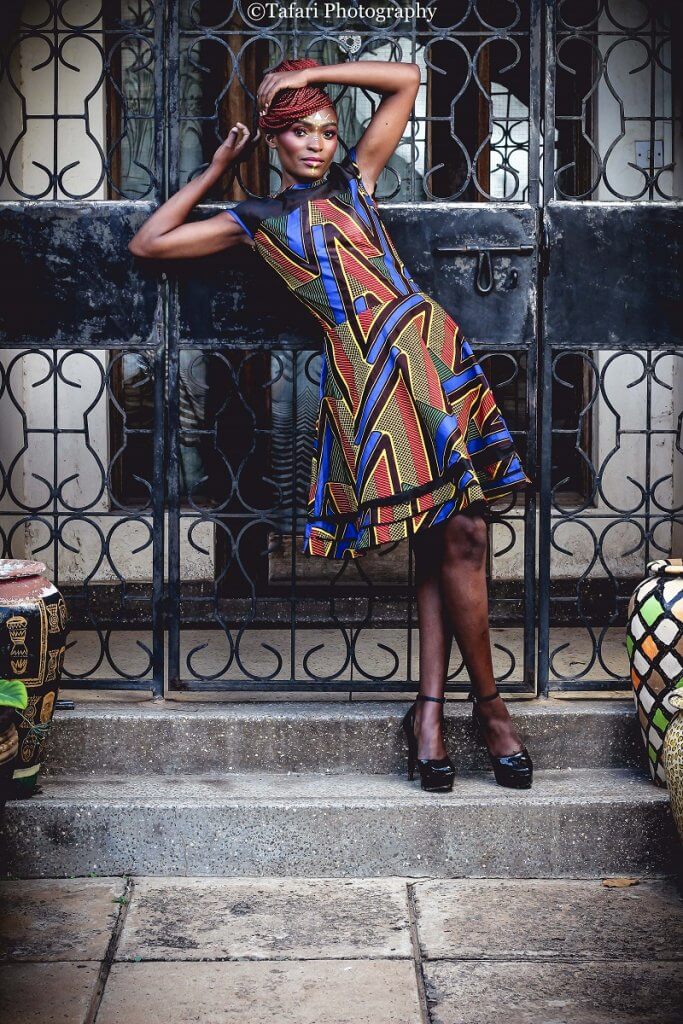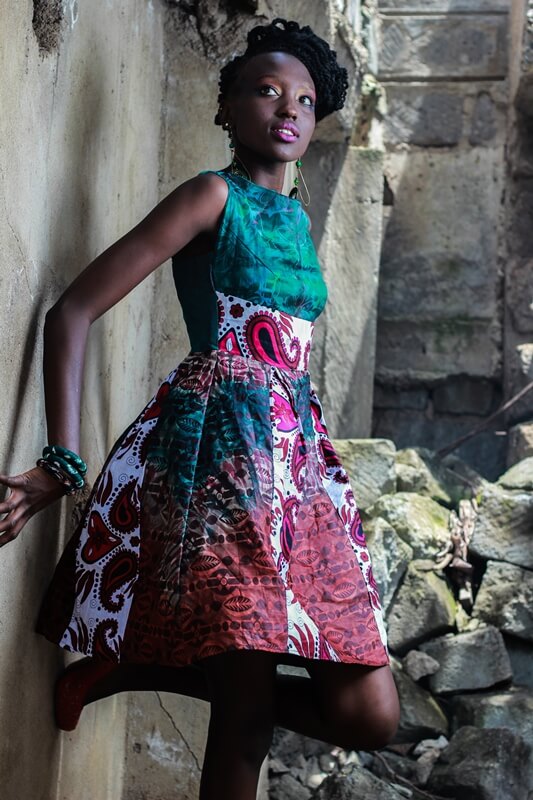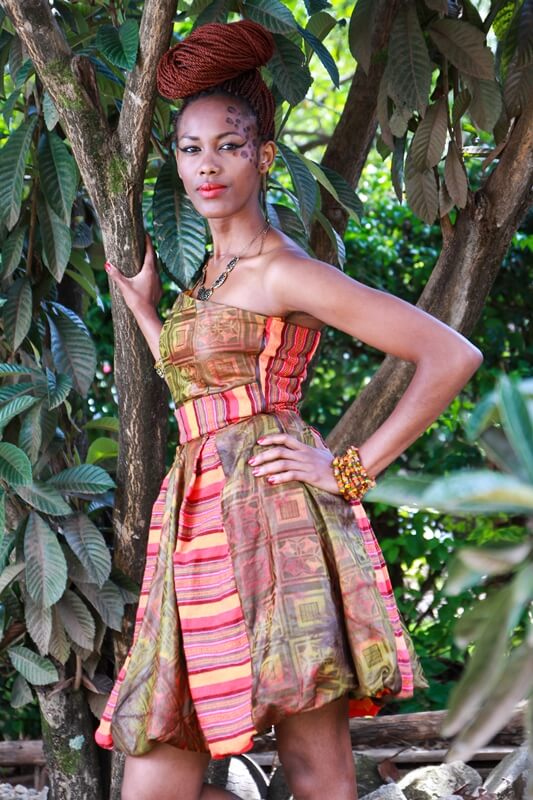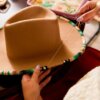My name is Lorna Abwonji founder and Creative Director of Mia Mara Creations. Mia Mara means ‘Give Me Mine’ in my native language Luo.
Nairobi is a very cosmopolitan city and you can find a variety of nationalities and a huge blend of Kenyans from all over the country. That makes Nairobi a melting pot of ideas and inspiration that is great for an artist.
I’ve been a fashion designer professionally for 10 years now, currently doing custom-made clothing for my clients.
By the time I began my professional fashion career, I was very confused about where to start. There was no mentorship being offered by the industry and the industry in itself barely had any structure [still has some way to go even presently]
I took it upon myself to just learn and teach myself what I needed to know in order to reach the next level. At the time I didn’t even know what that next level was, all I knew was that I needed to make money, to prove to myself that I had made the right move.
So I will be sharing in this article some helpful tips that have helped me in my career so far as a designer that will probably also be helpful to you as a Creative as well.
Finding Your Niche Takes Time
There is a pressure that comes with being a Creative, most of the pressure is that one needs to make a living from their craft.
Being in a country where getting employment in the fashion field is hard especially for designers, most of us end up starting businesses whether we know what we are doing or not. And we just tend to do what we have seen others doing whether it is working or not.
I would advise that you take your time [if possible] because the truth is you will be a jack of all trades for some time before you discover what you really want to focus on. I have seen people drop out of fashion because it was taking too long to pick up and they needed to make a living. I have also seen people trying to copy successful designers so they could get ahead and then fail. Being a Creative is a journey and it’s unique to one’s gifting, no matter how similar it can be to someone else’s it’s never the same. Also, it may take years for others to figure it out, and it may take months, everyone’s journey is different the key is to keep working at it.
You may also reach a place where you plateau and you may have to reinvent yourself again. If you had written off export you may have to consider it, if you had sworn off bridal wear, you may have to explore it. Being an artist means being open to new inspiration and direction.
Study A Business Course In Addition To Your Fashion Course
I have never been the kind of person who likes school so I can tell you finding the business class to suit my needs was a challenge for the longest time. Fortunately for me, there are many short classes that have cropped up over the years, and best of all have no exams [whoop whoop]
I did a course offered by an organization called Sinapis. What I liked about them was that the course was very popular and the assignment was basically your business because it is structured in a business plan format. It was essentially a 16-week program and class was once a week. This worked very well with me and also the fact that I got to be with other entrepreneurs was a huge bonus because we got to share a lot about our businesses.
Such courses help you narrow down on your niche market and where you want your business to go and also become investor ready.
Join A Network Of Designers [Creatives In The Same Field]
I have found being in a community of other designers very helpful especially in terms of getting information and basically sharing challenges and opportunities
Being in a platform like this is not always easy because generally, designers don’t like to share information but its usually important so that you can build trust and eventually the information comes.
People have a habit of copying one another’s ideas and business models [that’s for all businesses] so it has created a climate where people avoid sharing information.
Either way, if one can, it’s important to be part of a community, there are times when business is not going as you would expect or want and that is where you can get help and encouragement.
It is also through these platforms that one can get mentors for their businesses or even internships.
Some platforms I would suggest in Kenya are the various groups on Facebook such as Kenya fashion focus Group, as well as the various WhatsApp groups and other forums organized for people to meet up like the Meet and Mingle events at the Metta lab, networking events by HEVA fund and Creatives Garage, GoDown Arts Centre and many more.
Participate In Forums That Help Grow Your Business
There are so many platforms that help creative entrepreneurs grow their businesses. I have had the privilege of being part of several of them and they not only help with information but also with opportunities.
One of them is offered by our Kenyan government – one by the Export Promotion Council [EPC} where there is a year’s training in getting ready for the export market. It has very flexible timelines and even if one doesn’t want to export the training helps get your products to international standards. They do an annual intake so one needs to be on the mailing list to get an alert.
There is also international platforms such as She Trades that is an initiative of the International Trade Centre to help women entrepreneurs get access to the global market. Once can join the platform at any time there is no time constraint
Having been a Mandela Washington Fellow from the Young African Leaders Initiative was also a big bonus for me because it exposed me to think about my business on a global scale as well as mingle with other Africans and grow my networks across the continent. They are open once a year for the Mandela Washington fellowship [MWF] and three times a year for the Regional Leadership Centers [RLC]but one can be part of the YALI network online for free.
There are many more out there
Participate In Competitions
This also helps you grow your business because of the visibility that it will offer.
Not only that, competitions have a way of challenging how you think as a creative.
I have been part of competitions that brought both the best in me and the worst and others further clarified who I was as a designer.
One of the first competitions I was ever a part of was RAFDA [REDDS AFRICA FASHION DESIGN AWARDS] in 2008 and this affirmed me that I was in the right path since it was right out of college.
I have also been a finalist for FA254 [Africa Designers FOR Tomorrow competition] 2014
I was also in a local reality show that had a similar format to Project Runway, called Safari Fashion Runway.
I did not win in any but I learned a lot about my style of work, they kept me on my feet to always keep challenging myself, I also grew more confident in my work and learned so much more about myself as well in the process.
Treat People Well
Sometimes as creatives we can focus so much on what we want to be accomplished that we can overlook those assisting us or working for us.
The biggest hurdle for most designers in Kenya are tailors [since most designers are self-employed and do it all]
I believe the main issue is that the training for each one of them varies with who they learned from since some learned from apprenticeship and very few from technical colleges. Because of this when you hire one you have to train them to know how you want your work to be done, which is time-consuming.
Either way, all employees need to be treated well, paid well and given good working conditions. Creative work is always treated as an emergency that leaves little room sometimes to do the work efficiently. And most of the time we take it because work can be scarce at times, but in the long run, stress ourselves and our staff.
These situations can’t always be controlled but they can be explained to staff members so it doesn’t cause friction. However, in the long run, a culture needs to be created where there is respect for the creative process so work is done in a good timely manner.
The other issue at times is that creatives take in more work than they can handle or don’t manage expectations very well.
Conclusion
I have always loved being around creatives in general, not just fashion designers. There is a way it feels like there is a common bond because we think differently and we understand why one may be the odd person. We live by no rules and want to live in our own world [though not always possible]
I will encourage one thing that has been of great benefit, it’s important for every artistic person to travel and open their minds up to inspiration and different cultures and just meet with people who think differently from you.
It influences your mind a lot in how you think and create.
Also, use the internet as a tool to research and learn, not just to get inspiration. There is a lot of information online on how to grow creative businesses and learn from other people’s past experiences in the industry.
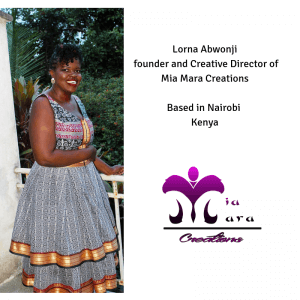
She is the Project manager at Dress Up Kenya. RAFDA 2008 Finalist & FA254 Finalist 2014. Lorna is a 2016 YALI Mandela Washington Fellow.

